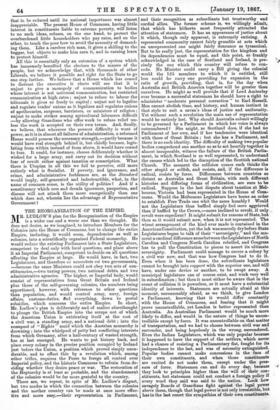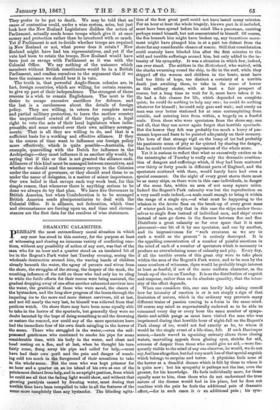THE REORGANIZATION OF THE EMPIRE.
MR. LUDLOW'S plan for the Reorganization of the Empire is a wider one and a worse one than we thought. He does not desire, as we imagined, to introduce Members for the Colonies into the House of Commons, but to change the entire Empire, including, it would seem, dependencies as well as colonies, into a scientifically organized Federal monarchy. He would reduce the existing Parliament into a State Legislature, competent to deal only with local questions, and place above it an Imperial Parliament, competent to decide on all questions affecting the Empire at large. He would have, in fact, two Legislatures, and therefore ex necessitate rei two government, —because the same Ministers could not obey two sets of con- stituencies,—two taxing powers, two national debts, and two administrative agencies. The higher, or Impexial body, would consist of representatives from Great Britain and Ireland plus those of the self-governing colonies, the numbers being apportioned, however, with reference to other questions than population, and would control army, navy, foreign affairs, customs-duties, find everything, down to postal subsidies, which concerns the entire Empire. In short, Mr. Ludlow's plan is deliberately and of malice aforethought to plunge the British Empire into the scrape out of which the American Union is extricating itself at the cost of a civil war, a standing army, and a national debt ; into the cesespool of " Rights " amid which the Austrian monarchy is drowning ; into the whirlpool of petty but conflicting interests from which Germany, after a half-century of wasted strength, has at last emerged. He wants to put history back, and place every colony in the precise position occupied by Ireland just before the Union, a position which proved simply unen- durable, and to effect this- by a revolution which, among other trifles, requires the Peers to forego all control over Imperial policy, and the historic Commons to refrain from de- ciding whether they desire peace or war. The restoration of the Heptarchy is at least as probable, and the abandonment of the colonies would be far more grateful to the country.
There are, we repeat, in spite of Mr. Ludlow's disgust, but two modes in which the connection between the colonies and the mother country can be made at once more effec- tive and more easy,—their representation in Parliament, and their recognition as subordinate but trustworthy and cordial allies. The former scheme is, we willingly admit, that which has hitherto most frequently attracted the attention of statesmen. It has an appearance of justice about it which, though only apparent, is extremely enticing. A represented community cannot fairly grumble at acts which an unrepresented one might fairly denounce as tyrannical. But to be really just, the representation for the kingdom and its dependencies must be equal, and this point, so frankly acknowledged in the case of Scotland and Ireland, is pre- cisely the one which this country will refuse to con- cede. No Minister could carry a Bill giving the colonial world the 125 members to which it is entitled, still less could he carry one providing for expansion in the ratio of growth, providing, that is, for the day when Australia and British America together will be greater than ourselves. He might as well provide that if Lord Amberley ever became a successful statesman he should have a right to administer "moderate personal correction" to Earl Russell. Men cannot abolish time, and history, and human instinct in that style to suit a savan's ideas of justice and uniformity. Yet without such a revolution the main use of representation would be entirely lost. Why should Australia submit willingly to be governed by a Parliament in which her voice is always outnumbered ? She might, as Scotland does, if she had no Parliament of her own, and if her tendencies were identical with those of Great Britain ; but she has a Parliament, and there is no such identity. The difficulty of making two popular bodies comprehend one another so as to act heartily together is almost insuperable, witness the failure of the British Parlia- ment, in which Scotland is so well represented, to understand the causes which led to the disruption of the Scottish national Church. The moment the collision comes each thinks the other stupid or selfish, and resists, and, if the difference is radical, resists by force. Differences between countries so distant as Australia and Great Britain, with such• different histories and differing forms of civilization, are sure to be radical. Suppose in the last dispute about taxation at Mel- bourne, Victoria had been represented in the House of Com- mons. Would the Melbourne Legislature have borne an order to establish Free Trade one whit the more humbly ? Would not the Legislature thus baffled simply feel more aggrieved than if baffled by the Crown,—more inclined to revolt, if only revolt were expedient? It might submit for reasons of State, but then so it would submit now, when it is not represented. The wisest arrangement of the kind ever made is contained in the American Constitution, yet the ink was scarcely drybefore State Legislatures began to talk of their "sovereignty," and the mo- ment a cardinal difference arosebetween theLegislature of North Carolina and Congress North Carolina rebelled, and Congress has to pull the Constitution to pieces to assert its ultimate sovereignty. Parliament could manage to coerce a colony by a civil war now, and that was how Congress had to do it. Even when it has been done, the subordinate legislature cannot be brought into rapport with the superior one, and will have, under one device or another, to be swept away. A municipal legislature can of course exist, and work very well in subordination ; but then it must either be aware that in the event of collision it is powerless, or it must have a substantial identity of interests. Statesmen are actually afraid at this moment, unreasonably afraid, as we think, to give London a Parliament, knowing that it would differ constantly with the House of Commons and fearing that it might prove uncontrollable, yet London is better represented than Australia. An Australian Parliament would be much more likely to differ, and would in the nature of things be uncon- trollable except by force. It was uncontrollable on that matter of transportation, and we had to choose between civil war aid surrender, and being hopelessly in the wrong, surrendered. Even the Indian Legislature, which was only popular because it happened to have the support of the settlers, which never had a chance of resisting a Parliamentary fiat, fought for its independence to the last, and was of necessity extinguished. Popular bodies cannot make concessions in the face of their own constituents, and when those constituents are excited do not make them, except under the es- sure of force. Statesmen can and do every day, because they look to principles higher than the will of their con- stituents, but statesmen could not conduct a foreign policy if every word they said was said to the nation. Look how savagely Boards of Guardians fight against the legal power above them, though that legal power is not only irresistible, but has in the last resort the sympathies of their own constituents. They prefer to be put to death. We may be told that no cause of contention could, under a wise system, arise, but just look how the New Zealand Legislature dislikes the action of Parliament, actually sends home troops which give it at once money and protection rather than be interfered with so much. Yet if Parliament is not to decide whether troops are required in New Zealand or not, what power does it retain? New Zealand might have had ten representatives, and yet if the vote had been to retain the troops, New Zealand would. have been just as savage with Parliament as it was with the Colonial Office. We say nothing of the nuisance which members without British constituents would be in a British Parliament, and confine ourselves to the argument that if we bore the nuisance we should bear it in vain.
The truth is, that powerful Anglo-Saxon colonies are, in fact, foreign countries, which are willing, for certain reasons, to give up part of their independence. The strongest of those reasons is a wish to remain Englishmen. The next is the desire to escape excessive sacrifices for defence, and the last is a carelessness about the details of foreign policy. They are willing, in return for complete naval and partial military protection, to leave the mother country the unquestioned control of their foreign policy, a legal right to veto the acts of their local legislature when indis- pensable, and some control over their own military arrange- ments. That is all they are willing to do, and that is a sufficient basis for a working and effective alliance If they in the course of time want to influence our foreign policy more effectively, which is quite possible—Australia, for example, quarrelling with the Dutch for influence in the Archipelago—they must influence it as another ally would, by saying that if this or that is not granted the alliance ends. Alliances of this kind must be managed between executives, and whether we should send the necessary envoys to the Colonies under the name of governors, or they should send them to us under the name of delegates, is a matter of minor importance. Our own belief is that envoys each way work best, for this simple reason, that whenever there is anything serious to be done we always do try that plan. We have five Governors in British America, but when Confederation is to be arranged British America sends plenipotentiaries to deal with the Colonial Office. It is alliance, not federation, which time and circumstances are forcing upon us, and time and circum- stances are the first data for the resolves of wise statesmen.































 Previous page
Previous page